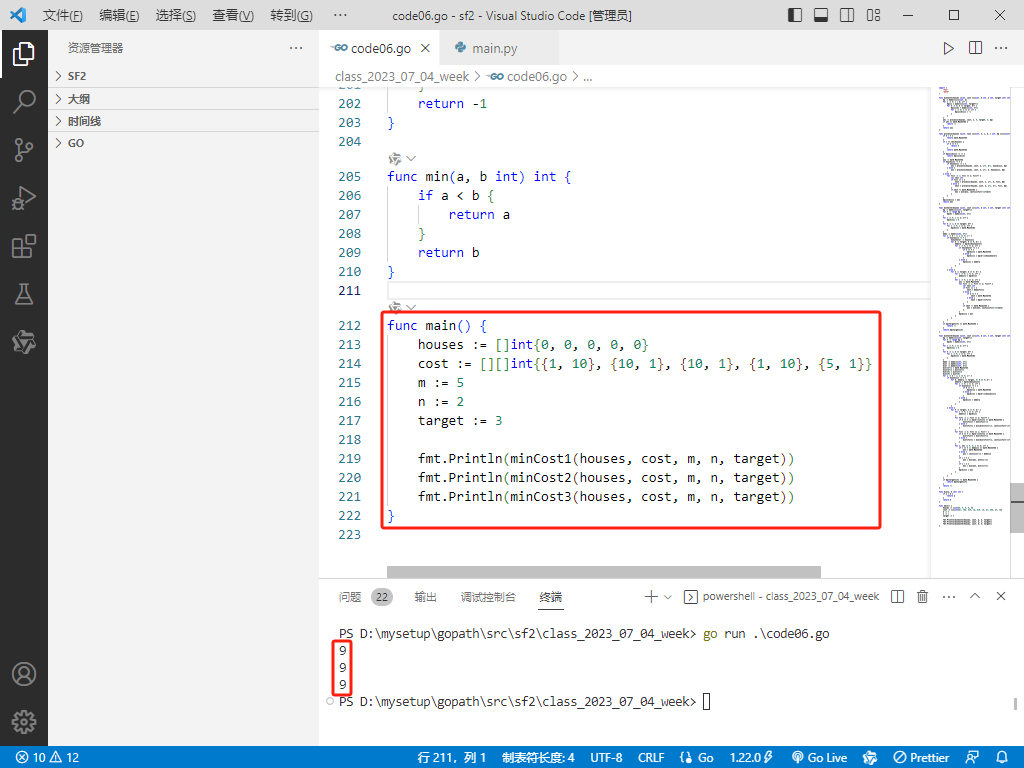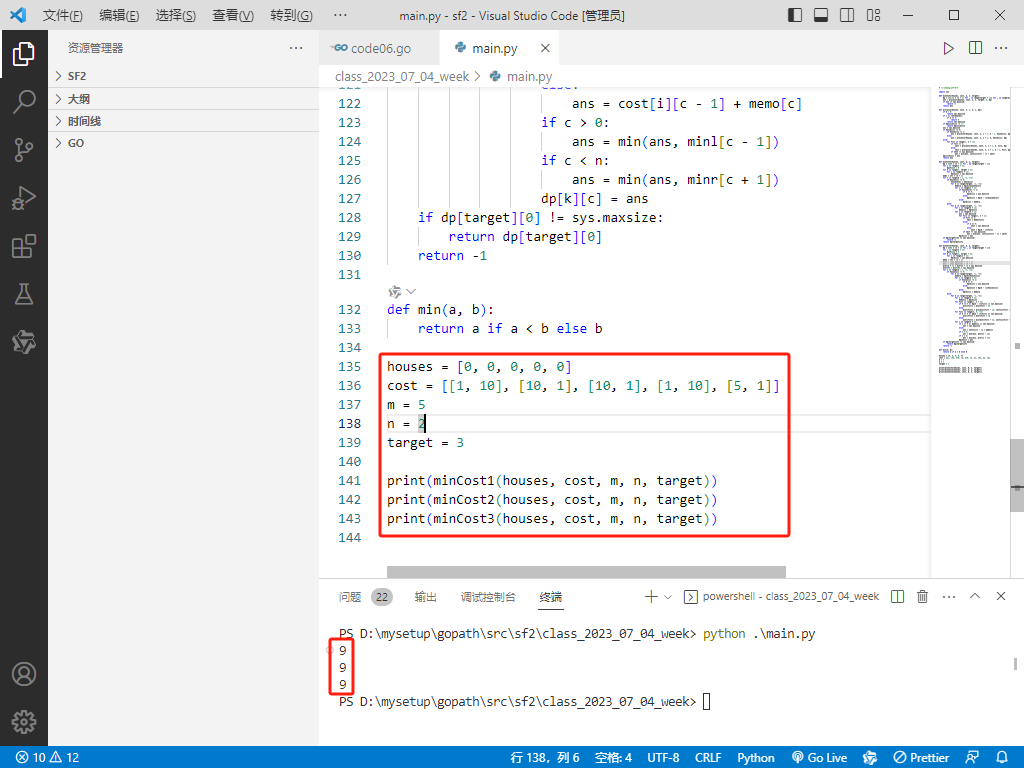2024-04-03:用go语言,在一个小城市里,有 m 个房子排成一排, 你需要给每个房子涂上 n 种颜色之一(颜色编号为 1 到 n ), 有的房子去年夏天已经涂过颜色了,所以这些房子不可以被重新
2024-04-03:用go语言,在一个小城市里,有 m 个房子排成一排,
你需要给每个房子涂上 n 种颜色之一(颜色编号为 1 到 n ),
有的房子去年夏天已经涂过颜色了,所以这些房子不可以被重新涂色,
我们将连续相同颜色尽可能多的房子称为一个街区。
比方说 houses = [1,2,2,3,3,2,1,1],
它包含 5 个街区 [{1}, {2,2}, {3,3}, {2}, {1,1}]。
给你一个数组 houses ,一个 m * n 的矩阵 cost 和一个整数 target,其中:
houses[i]:是第 i 个房子的颜色,0 表示这个房子还没有被涂色,
cost[i][j]:是将第 i 个房子涂成颜色 j+1 的花费。
请你返回房子涂色方案的最小总花费,使得每个房子都被涂色后,恰好组成 target 个街区。
如果没有可用的涂色方案,请返回 -1。
输入:houses = [0,0,0,0,0], cost = [[1,10],[10,1],[10,1],[1,10],[5,1]], m = 5, n = 2, target = 3。
输出:9。
答案2024-04-03:
来自左程云。
大体步骤如下:
minCost1函数:
1.首先,创建一个三维数组dp,用于记录状态转移的结果。dp[i][k][c]表示将前i个房子涂色,形成k个街区,并且第i个房子颜色为c+1时的最小总花费。
2.然后,调用process1函数,进行递归计算。
3.在process1函数中,首先处理边界情况:如果k小于0,返回无穷大;如果i等于房子数量,如果k等于0,返回0,否则返回无穷大。
4.如果dp[i][k][c]已经计算过,直接返回结果。
5.接着,判断第i个房子的颜色是否已经确定(houses[i] != 0):
-
如果颜色已经确定,判断该颜色是否与c相同,分别递归处理下一个房子(i+1)和剩余街区数量(k-1或k)。
-
如果颜色未确定,遍历每种可能的颜色(1到n),分别递归处理下一个房子和剩余街区数量,并记录选择花费最小的方案。
6.将结果存入dp[i][k][c],并返回结果。
minCost2函数:
1.创建一个二维数组dp,用于记录状态转移的结果。dp[k][c]表示形成k个街区,且最后一个房子颜色为c+1时的最小总花费。
2.首先初始化dp数组:对于k=0(没有街区)和所有的颜色c,花费为0;对于k>0和所有的颜色c,花费初始化为无穷大。
3.然后,从后向前遍历房子,处理每个房子的情况:
-
如果房子颜色已经确定(houses[i] != 0),更新dp数组中对应位置的值。
-
如果房子颜色未确定,通过dp数组中记录的上一次的结果,计算每个街区数量和颜色的最小花费,更新dp数组中对应位置的值。
4.最后,返回dp[target][0]的结果,如果为无穷大则返回-1。
minCost3函数:
1.创建一个二维数组dp,用于记录状态转移的结果。dp[k][c]表示形成k个街区,且最后一个房子颜色为c+1时的最小总花费。
2.首先初始化dp数组和辅助数组minl和minr:
-
对于k=0(没有街区)和所有的颜色c,花费为0;
-
对于k>0和所有的颜色c,花费初始化为无穷大;
-
minl[i]表示前i个颜色中最小的花费,minr[i]表示从第i个颜色到第n个颜色中最小的花费。
3.然后,从后向前遍历房子,处理每个房子的情况:
-
如果房子颜色已经确定(houses[i] != 0),更新dp数组中对应位置的值。
-
如果房子颜色未确定,通过dp数组中记录的上一次的结果和辅助数组minl和minr,计算每个街区数量和颜色的最小花费,更新dp数组中对应位置的值。
4.最后,返回dp[target][0]的结果,如果为无穷大则返回-1。
这3种算法的时间复杂度和空间复杂度如下:
-
minCost1:时间复杂度为O(m * n^target),空间复杂度为O(m * target * n)。
-
minCost2:时间复杂度为O(m * target * n^2),空间复杂度为O(target * n)。
-
minCost3:时间复杂度为O(m * target * n^2),空间复杂度为O(n)。
Go完整代码如下:
package main
import (
"fmt"
"math"
)
func minCost1(houses []int, cost [][]int, m int, n int, target int) int {
dp := make([][][]int, m)
for i := 0; i < m; i++ {
dp[i] = make([][]int, target+1)
for k := 0; k <= target; k++ {
dp[i][k] = make([]int, n+1)
for c := 0; c <= n; c++ {
dp[i][k][c] = -1
}
}
}
ans := process1(houses, cost, n, 0, target, 0, dp)
if ans == math.MaxInt32 {
return -1
}
return ans
}
func process1(houses []int, cost [][]int, n, i, k, c int, dp [][][]int) int {
if k < 0 {
return math.MaxInt32
}
if i == len(houses) {
if k == 0 {
return 0
}
return math.MaxInt32
}
if dp[i][k][c] != -1 {
return dp[i][k][c]
}
ans := math.MaxInt32
if houses[i] != 0 {
if houses[i] != c {
ans = process1(houses, cost, n, i+1, k-1, houses[i], dp)
} else {
ans = process1(houses, cost, n, i+1, k, houses[i], dp)
}
} else {
for fill := 1; fill <= n; fill++ {
var next int
if fill == c {
next = process1(houses, cost, n, i+1, k, fill, dp)
} else {
next = process1(houses, cost, n, i+1, k-1, fill, dp)
}
if next != math.MaxInt32 {
ans = min(ans, cost[i][fill-1]+next)
}
}
}
dp[i][k][c] = ans
return ans
}
func minCost2(houses []int, cost [][]int, m int, n int, target int) int {
dp := make([][]int, target+1)
for k := range dp {
dp[k] = make([]int, n+1)
}
for c := 0; c <= n; c++ {
dp[0][c] = 0
}
for k := 1; k <= target; k++ {
for c := 0; c <= n; c++ {
dp[k][c] = math.MaxInt32
}
}
memo := make([]int, n+1)
for i := m - 1; i >= 0; i-- {
if houses[i] != 0 {
houseColor := houses[i]
for k := target; k >= 0; k-- {
memory := dp[k][houseColor]
for c := 0; c <= n; c++ {
if houseColor != c {
if k == 0 {
dp[k][c] = math.MaxInt32
} else {
dp[k][c] = dp[k-1][houseColor]
}
} else {
dp[k][c] = memory
}
}
}
} else {
for k := target; k >= 0; k-- {
for c := 0; c <= n; c++ {
memo[c] = dp[k][c]
}
for c := 0; c <= n; c++ {
ans := math.MaxInt32
for fill := 1; fill <= n; fill++ {
var next int
if fill == c {
next = memo[fill]
} else {
if k == 0 {
next = math.MaxInt32
} else {
next = dp[k-1][fill]
}
}
if next != math.MaxInt32 {
ans = min(ans, cost[i][fill-1]+next)
}
}
dp[k][c] = ans
}
}
}
}
if dp[target][0] == math.MaxInt32 {
return -1
}
return dp[target][0]
}
func minCost3(houses []int, cost [][]int, m int, n int, target int) int {
dp := make([][]int, target+1)
for k := range dp {
dp[k] = make([]int, n+1)
}
for c := 0; c <= n; c++ {
dp[0][c] = 0
}
for k := 1; k <= target; k++ {
for c := 0; c <= n; c++ {
dp[k][c] = math.MaxInt32
}
}
memo := make([]int, n+1)
minl := make([]int, n+2)
minr := make([]int, n+2)
minr[n+1] = math.MaxInt32
minl[n+1] = minr[n+1]
minr[0] = minl[n+1]
minl[0] = minr[0]
for i := m - 1; i >= 0; i-- {
if houses[i] != 0 {
for k, memory := target, 0; k >= 0; k-- {
memory = dp[k][houses[i]]
for c := 0; c <= n; c++ {
if houses[i] != c {
if k == 0 {
dp[k][c] = math.MaxInt32
} else {
dp[k][c] = dp[k-1][houses[i]]
}
} else {
dp[k][c] = memory
}
}
}
} else {
for k := target; k >= 0; k-- {
for c := 0; c <= n; c++ {
memo[c] = dp[k][c]
}
for fill := 1; fill <= n; fill++ {
if k == 0 || dp[k-1][fill] == math.MaxInt32 {
minl[fill] = minl[fill-1]
} else {
minl[fill] = min(minl[fill-1], cost[i][fill-1]+dp[k-1][fill])
}
}
for fill := n; fill >= 1; fill-- {
if k == 0 || dp[k-1][fill] == math.MaxInt32 {
minr[fill] = minr[fill+1]
} else {
minr[fill] = min(minr[fill+1], cost[i][fill-1]+dp[k-1][fill])
}
}
for c, ans := 0, 0; c <= n; c++ {
if c == 0 || memo[c] == math.MaxInt32 {
ans = math.MaxInt32
} else {
ans = cost[i][c-1] + memo[c]
}
if c > 0 {
ans = min(ans, minl[c-1])
}
if c < n {
ans = min(ans, minr[c+1])
}
dp[k][c] = ans
}
}
}
}
if dp[target][0] != math.MaxInt32 {
return dp[target][0]
}
return -1
}
func min(a, b int) int {
if a < b {
return a
}
return b
}
func main() {
houses := []int{0, 0, 0, 0, 0}
cost := [][]int{{1, 10}, {10, 1}, {10, 1}, {1, 10}, {5, 1}}
m := 5
n := 2
target := 3
fmt.Println(minCost1(houses, cost, m, n, target))
fmt.Println(minCost2(houses, cost, m, n, target))
fmt.Println(minCost3(houses, cost, m, n, target))
}

Python完整代码如下:
# -*-coding:utf-8-*-
import sys
def minCost1(houses, cost, m, n, target):
dp = [[[-1] * (n + 1) for _ in range(target + 1)] for _ in range(m)]
ans = process1(houses, cost, n, 0, target, 0, dp)
if ans == sys.maxsize:
return -1
return ans
def process1(houses, cost, n, i, k, c, dp):
if k < 0:
return sys.maxsize
if i == len(houses):
if k == 0:
return 0
return sys.maxsize
if dp[i][k][c] != -1:
return dp[i][k][c]
ans = sys.maxsize
if houses[i] != 0:
if houses[i] != c:
ans = process1(houses, cost, n, i + 1, k - 1, houses[i], dp)
else:
ans = process1(houses, cost, n, i + 1, k, houses[i], dp)
else:
for fill in range(1, n + 1):
if fill == c:
next = process1(houses, cost, n, i + 1, k, fill, dp)
else:
next = process1(houses, cost, n, i + 1, k - 1, fill, dp)
if next != sys.maxsize:
ans = min(ans, cost[i][fill - 1] + next)
dp[i][k][c] = ans
return ans
def minCost2(houses, cost, m, n, target):
dp = [[0] * (n + 1) for _ in range(target + 1)]
for c in range(n + 1):
dp[0][c] = 0
for k in range(1, target + 1):
for c in range(n + 1):
dp[k][c] = sys.maxsize
memo = [0] * (n + 1)
for i in range(m - 1, -1, -1):
if houses[i] != 0:
houseColor = houses[i]
for k in range(target, -1, -1):
memory = dp[k][houseColor]
for c in range(n + 1):
if houseColor != c:
if k == 0:
dp[k][c] = sys.maxsize
else:
dp[k][c] = dp[k - 1][houseColor]
else:
dp[k][c] = memory
else:
for k in range(target, -1, -1):
for c in range(n + 1):
memo[c] = dp[k][c]
for c in range(n + 1):
ans = sys.maxsize
for fill in range(1, n + 1):
if fill == c:
next = memo[fill]
else:
if k == 0:
next = sys.maxsize
else:
next = dp[k - 1][fill]
if next != sys.maxsize:
ans = min(ans, cost[i][fill - 1] + next)
dp[k][c] = ans
if dp[target][0] == sys.maxsize:
return -1
return dp[target][0]
def minCost3(houses, cost, m, n, target):
dp = [[0] * (n + 1) for _ in range(target + 1)]
for c in range(n + 1):
dp[0][c] = 0
for k in range(1, target + 1):
for c in range(n + 1):
dp[k][c] = sys.maxsize
memo = [0] * (n + 1)
minl = [sys.maxsize] * (n + 2)
minr = [sys.maxsize] * (n + 2)
minl[n + 1] = minr[n + 1] = sys.maxsize
minl[0] = minr[0] = sys.maxsize
for i in range(m - 1, -1, -1):
if houses[i] != 0:
for k in range(target, -1, -1):
memory = dp[k][houses[i]]
for c in range(n + 1):
if houses[i] != c:
if k == 0:
dp[k][c] = sys.maxsize
else:
dp[k][c] = dp[k - 1][houses[i]]
else:
dp[k][c] = memory
else:
for k in range(target, -1, -1):
for c in range(n + 1):
memo[c] = dp[k][c]
for fill in range(1, n + 1):
if k == 0 or dp[k - 1][fill] == sys.maxsize:
minl[fill] = minl[fill - 1]
else:
minl[fill] = min(minl[fill - 1], cost[i][fill - 1] + dp[k - 1][fill])
for fill in range(n, 0, -1):
if k == 0 or dp[k - 1][fill] == sys.maxsize:
minr[fill] = minr[fill + 1]
else:
minr[fill] = min(minr[fill + 1], cost[i][fill - 1] + dp[k - 1][fill])
for c in range(n + 1):
if c == 0 or memo[c] == sys.maxsize:
ans = sys.maxsize
else:
ans = cost[i][c - 1] + memo[c]
if c > 0:
ans = min(ans, minl[c - 1])
if c < n:
ans = min(ans, minr[c + 1])
dp[k][c] = ans
if dp[target][0] != sys.maxsize:
return dp[target][0]
return -1
def min(a, b):
return a if a < b else b
houses = [0, 0, 0, 0, 0]
cost = [[1, 10], [10, 1], [10, 1], [1, 10], [5, 1]]
m = 5
n = 2
target = 3
print(minCost1(houses, cost, m, n, target))
print(minCost2(houses, cost, m, n, target))
print(minCost3(houses, cost, m, n, target))




 浙公网安备 33010602011771号
浙公网安备 33010602011771号